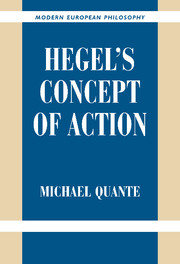Book contents
1 - Conceptual Presuppositions: Person and Subject
Published online by Cambridge University Press: 05 September 2009
Summary
The Transition from Right to Morality
“Crime and avenging justice represent the shape of the will's development when it has proceeded to the distinction between the universal will which has being in itself, and the individual will which has being for itself in opposition to the universal” (R §104). In Hegel's view, the universal being-in-itself will is the system of the determinations of Right that constitute Abstract Right. These determinations are based on the principle of “personality,” which itself is the expression of the universal moment of the will qua concept. Hegel describes this universal moment with the formula “I = I,” which expresses the thinking self-relation. The subject-object difference is overcome in this self-relationship, because – as Hegel interprets the formula I = I – the copula expresses an identity of the subject with the object. This formula also expresses a thinking will's consciousness of freedom; such a will is free from all determination and can direct itself to all possible objects. The “realizations” of this object-relationship (at the level of the in-itself) are taking-possession and the property relationship. In addition, for Hegel the formula I = I also indicates that this self-relationship is completely universal. Each thinking will stands in this relationship to itself – that is, in a relationship containing nothing of its individuality, of its particular will.
- Type
- Chapter
- Information
- Hegel's Concept of Action , pp. 13 - 55Publisher: Cambridge University PressPrint publication year: 2004



